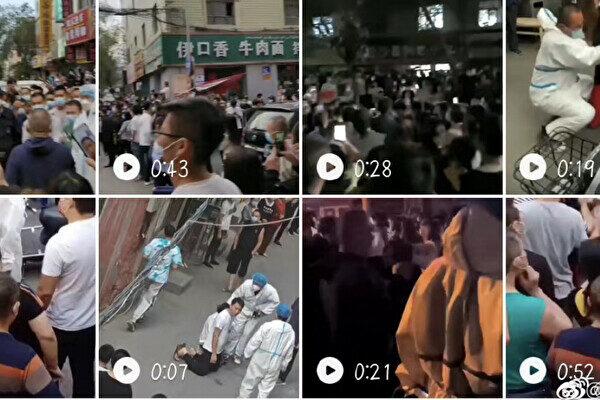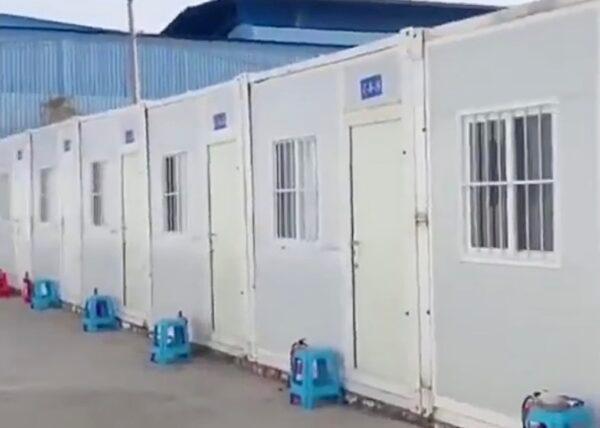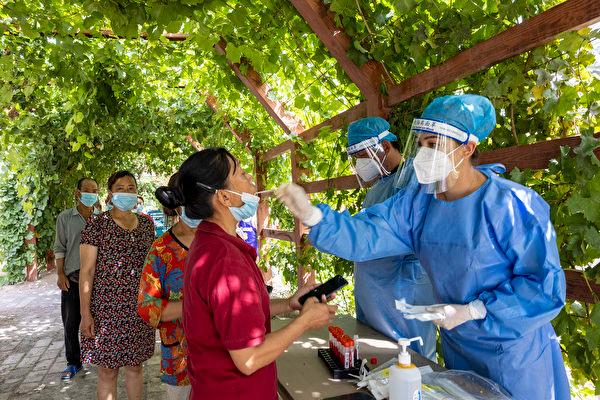A 32-year-old man died in a hospital in Xinjiang many hours after he was taken there by ambulance with severe abdominal pain.
During the seven to eight hours in the hospital, he received no medical treatment despite his pleading for help and painful groaning. The doctors and nurses on duty ignored him, according to the young man’s wife.
The widow accuses the communist regime’s inhumane zero-COVID policy for causing her husband’s death.
Lin Xiaoran (pseudonym), the wife, wrote on a Chinese social media platform: “Oh, Gracious Lord, please show me mercy. My husband died inexplicably, but why is it so difficult to have an explanation or an apology? I have done all I can to speak out, yet I am still voiceless!”
Husband Ignored by Doctors
Lin wants to keep both her husband and herself anonymous as she is afraid of retaliation by the authorities.“For seven to eight hours in the hospital, my husband had been sitting in the waiting hall of the hospital’s ER department, pleading for help, but the doctors and nurses just ignored him,” Lin said when speaking with the Chinese language edition of The Epoch Times on Oct. 22.

“When I asked the hospital for an explanation [for his death], they just said: ‘Don’t find fault with us. We are just grassroots staffers and we are all under quarantine.’”
According to Lin, her husband lived in Urumqi by himself because his job was there. His family lives in Karamay, a city surrounded by oil fields, about 200 miles northwest of Urumqi.
An ambulance took Lin’s husband to the Xinjiang People’s Hospital on the afternoon of Oct. 10. He was left in the lobby of the ER department, and wasn’t examined by any staff member.
The young man wasn’t receiving any help from the hospital, so he kept calling his family in Karamay.
“He called me, my mother, and his brother, and kept telling us that he was very painful and that nobody even looked at him,” Lin said, “Our hearts broke when we heard him groaning out of pain.”
At about 9 p.m. on Oct. 10, Lin’s husband said that the pain was unbearable, but he could not get any doctor or nurse to treat him.
Lin asked him to get a doctor or a nurse to give him some medication for the pain, but he said that although there were doctors and nurses in the waiting area, nobody would treat him.
Families Banned from Going to Urumqi
According to Lin, Urumqi has been locked down for over 60 days, and Karamay has been quarantined on and off. At this stage, Karamay was under lockdown for the third time this year, which meant leaving the city wouldn’t be easy.
They left home at about 9 p.m., but were stopped at the first checkpoint. The guards wouldn’t let them leave the area no matter how much they pleaded for leniency.
Lin called the local neighborhood community office, asking for permission to leave for Urumqi, but she was told to drive to the office to fill out forms and draft materials, such as, applications.
While they were waiting for the approval, Lin and the brother-in-law repeatedly called the hospital in Urumqi, but they could not get through. They called the Urumqi emergency hotline, but weren’t given any help.
Lin then called the police hotline in Urumqi. A police officer returned her call at about 11:30 p.m. telling her that he would go to the hospital to take a look.
Lin and her brother-in-law waited the whole night for a travel pass to Urumqi, but the party secretary of the neighborhood community office said: “If he passes away, we’ll let you go.”
Lin had no choice but to continue waiting in the office for a travel pass.
Lin kept calling her husband until his phone ran out of power. The hospital rejected Lin’s request to have his phone charged.
The police officer in Urumqi called her at about 12:50 a.m., saying that the hospital wouldn’t allow him to enter. “The hospital told him that my husband was sitting in the lobby, and they even said he couldn’t be possibly in any danger as there were doctors and nurses there,” Lin recalled the police officer told her.
At 4 a.m., Oct. 11, the police officer called Lin again, informing her that her husband had passed away.
However, Lin noted that the death certificate was issued at 1:50 a.m., almost two hours before the call she received. The cause of death on the certificate was sudden cardiac death.
“But doctors told us that he died of liver cirrhosis,” Lin said, “What they said was speculation, as they had done no checking or testing at all, and my husband was a very healthy person before he fell ill with the stomach.”
Demanded Information
Lin asked to watch the surveillance footage of the hospital to see what happened to her husband that night, but the hospital administration denied her request, saying “You are not in a position to watch the footage.”Lin called the Urumqi health commission and other relevant health bodies, but the only reply she received was: “I will forward your message to senior leaders.”
Lin said that the family demanded to meet the doctors on duty that night.
“I want them to tell me what they did that night to save my husband,” Lin said. But the two doctors on duty had left, saying that they were off duty now and they had nothing to do with her husband’s death since they had signed off.
The family demanded a forensic investigation, but the hospital said that there was no one available due to the lockdown.
Lin’s mother-in-law arrived in Urumqi the next day and together they had their beloved one cremated.
Lin and her relatives were isolated in Urumqi for seven days and then in home quarantine for five days when they got back to Karamay.
“Our home has been sealed from the outside,” Lin said.
Other Deaths in Xinjiang
In August, a toddler allegedly died amid the stringent lockdown measures in Yining City, Xinjiang.Liu Yan (pseudonym) told the Chinese language edition of The Epoch Times that her 54-year-old mother died in a hospital in Urumqi, Xinjiang, on Oct. 21. Her mother was hospitalized in August for kidney disease, and she tested positive for COVID-19 while she was staying in the hospital. Liu hadn’t seen her since August.
The actual number of victims of Beijing’s draconian zero-COVID measures could be much higher than what has been disclosed to the public.





